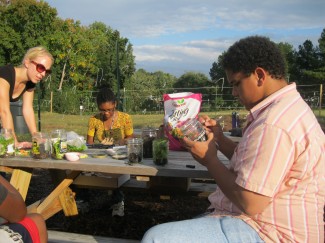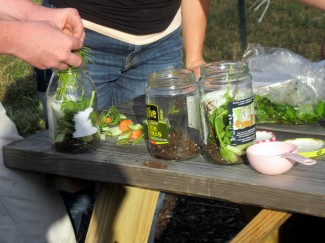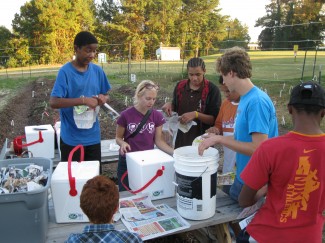It’s no secret the effects that food waste have on our environment and how food banks like Inter-Faith Food Shuttle play a role by directing perfectly good food away from landfills. We must seek how to incorporate environmentally-friendly practices across our many programs.
Opening the IFFS Teaching Farm: Goats on the Move
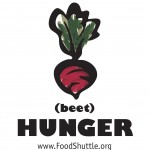 September is Hunger Action Month. Learn how volunteers help us BEET HUNGER every day. Sustainable farms are key to a food secure and hunger-free future - find out below how you can volunteer on our Teaching Farm like Yvonne and help us beet hunger, too!
Yvonne Wagner opens the Inter-Faith Food Shuttle Teaching Farm every Tuesday morning. One of the tasks included in this volunteer job is moving the goats from their paddock to fresh pasture to graze. It can be a risky business, but it's all part of running a farm!
September is Hunger Action Month. Learn how volunteers help us BEET HUNGER every day. Sustainable farms are key to a food secure and hunger-free future - find out below how you can volunteer on our Teaching Farm like Yvonne and help us beet hunger, too!
Yvonne Wagner opens the Inter-Faith Food Shuttle Teaching Farm every Tuesday morning. One of the tasks included in this volunteer job is moving the goats from their paddock to fresh pasture to graze. It can be a risky business, but it's all part of running a farm!
What else is involved in opening the farm? Watch Yvonne and find out!
How else can you help out on the IFFS Teaching Farm and help us BEET HUNGER?
Opening the Farm:
What's involved? Opening the chicken coop, feeding the chicks, chickens, and goats, collecting eggs, checking water feeders and checking the aquaponics greenhouse. Opening the farm is a daily task that takes 45 mins and should happen within 15-30 minutes after sunrise.
Closing the Farm:
What's involved? Securely latching chickens inside their coops and checking the electric chicken fence. Closing the farm is a daily task taking 15 mins that should happen at sundown.
Farm Stand:
The farm stand at Dover Rd is open Thursday and Friday from 12-6 pm, and Saturday from 9am-1pm. Tasks include basic math, using a scale to weigh vegetables, interacting directly with customers, and keeping accurate records. Managing the farm stand happens on Thurs, Fri, and Sat, with volunteers working a 3 hour shift, either opening (11:45-3) or closing (3-6 pm), or anytime on Saturday from (9-1).
Harvesting Crew:
Every Thursday, Friday, and Saturday mornings we harvest for the farm stand from 8 am to 11:30 am. Tasks include using harvesting tools such as a knife, scissors, shovel, or digging fork; washing, sorting, and packaging produce and eggs; and delivering them to the farm stand across the street.
Field Preparation Crew:
The field preparation crew tasks include tilling and building rows, hoeing and raking weeds, spreading compost and fertilizer, mowing and weed-eating walkways, moving deer and chicken fences, and transplanting from the greenhouse. These are daily tasks and can be either a morning (9-12) or afternoon (1-4) work time (these times are guidelines, our volunteer coordinator Laura Todd (Volunteers@FoodShuttle.org) does specific time scheduling).
Composting Crew:
We need volunteers to help with picking up brewers mash from local breweries in downtown Raleigh. What's involved? Driving a big box truck, depositing brewers mash in compost area, building and turning existing compost piles, checking compost temperature, and driving the tractor. Eventually, we hope to pick up food-waste from area restaurants to incorporate into our compost at the farm -pickups are typically 1-3 times per week in the afternoon and take between about an 1.5 hours from pickup to drop-off and mixing.
Please note that all Volunteer Opportunities can be taught on the farm to the appropriate candidates. All are welcome! Contact Joshua@FoodShuttle.org for more info.
Part 3: Gardening Class for Teens at Parrish Manor
Students from NC State University (NCSU) have partnered with Inter-Faith Food Shuttle to conduct a gardening class for teens in the community garden we manage at Parrish Manor, meeting once a week from Sept. 27 - Nov. 15. On the day I visited, NCSU Soil Science students Natalie and Jacob were teaching a lesson on compost. They brought with them a bag of un-enriched potting soil and some finished compost. As an experiment, they asked the class participants to fill 6 mason jars with the following: Potting soil + vegetable scraps; Potting soil + paper scraps; Potting soil + plastic scraps; Compost + vegetable scraps; Compost + paper scraps; Compost + plastic scraps.
The teens in the class then talked about which material might break down the fastest, considering factors like the amount of micro-organisms present, the amount of nitrogen, etc. Their hypotheses: The vegetables will break down in compost fastest, and the plastic in potting soil will break down slowest. They’ll monitor the jars in the coming weeks to see if their hypotheses are correct.
Natalie and Jacob also taught the class about waste management and jobs that involve waste treatment and composting. They began the lesson by asking the class to draw where they think waste from our toilets goes after it’s flushed, and ended by highlighting ecological waste water treatment practices like those in the EcoVillage of Findhorn, Scotland. They discussed job opportunities in composting, such as vermicomposting mico-enterprises, where such nutrient-rich worm castings are sold as natural fertilizer, and composting operations like CompostNow (another IFFS partner). It was clear to me these teens were seriously interested in this stuff –Kiara, who also works in the garden, is even thinking about changing her major at Wake Tech to something involving agriculture!
The following week, they nailed together compost bins for the garden, and the teens got to create their own vermicomposting bins!
Fun fact: Did you know that worms can eat twice their body weight in one day? Wow!
See what else has been happening in the Parrish Manor community and community garden in Part 1and Part 2 of this series.
IFFS Spring Fling Farm Festival
Last week, we held our Spring Planting celebration, announcing a $700K USDA grant to fund our Young Farmer Training Program. What else has been happening on the IFFS farm this Spring? Plenty! Sunday, April 1st, was the IFFS Spring Fling: A Farm Festival for the Whole Family, and the beautiful weather made the day perfect for celebrating springtime, indeed! There were lots of kids’ activities! Kids could decorate a clay pot in which to grow their own garden and take the plant home with them. There was also natural egg dying, an egg hunt, face-painting, games (like pin the tail on the rooster), and more!
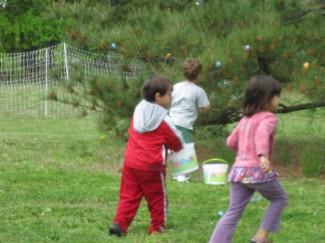
We were very excited to enjoy a demo and lesson from Arthur Gordon, Chef Emeritus and Owner of the Irregardless Café in Raleigh, which focuses on fresh, seasonal meals! The vegan wild tofu reubens he made were delicious - what a great way to use fresh cabbage from the garden!
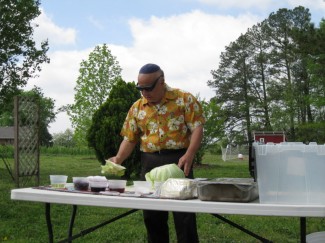

For dessert, we had Vanilla Ice Cream from NC State University – made right on their campus with fresh milk and cream from their cows!
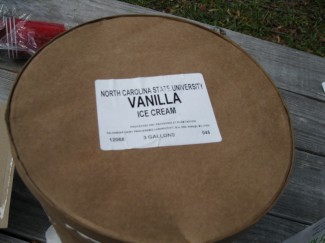
Kids and adults alike enjoyed the farm tour led by Young Farmer Training Program Apprectice Hunter and IFFS Farm Educator Sun Butler! Participants got to know the IFFS chickens, goats, bees, vermicomposting worms, and baby chicks!
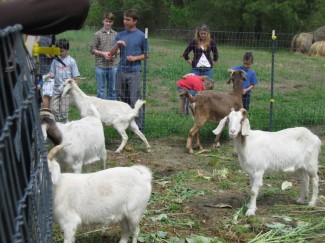
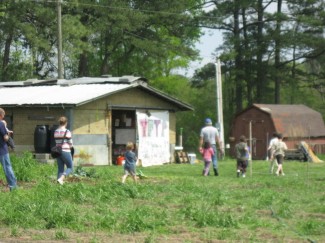
Along the way, those on the tour even got to witness a very special event – a bee swarm! Farm Educator Sun Butler was explaining the apiculture (bee-keeping) operations on the farm, when a great buzzing was heard, and the swarm emerged from the hive! This happens when the queen bee leaves the nest with a large group of drones to mate and form a new colony.
A Food Matters demonstration showing some easy, farm healthy recipes to make with veggies and herbs from the garden piqued our taste buds for warmer weather foods! Ginger, IFFS Nutrition Health Fair Intern, demonstrated how to make a classic tabouli salad, a black bean salsa, and a Greek-style cucumber and yogurt dip with dill. Yum!

The day of festivities also included a composting demonstration! Participants dissected the compost pile, observed the pile "cooking itself" at 150 degrees, and visited with the composting worms in our new wormhouse. Participants also learned how soil biology makes nutrients available to the plants when organic matter is added to the soil in the form of compost or cover crops.
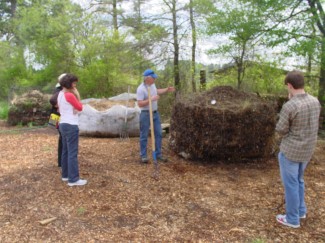
Slideshow of photos:
Alchemy!
Teens at Parrish Manor made breakfast burritos with eggs, beans, and veggies as well as pineapple and cucumber salsa...

After a tasty meal, we composted the scraps in the neighborhood community garden!
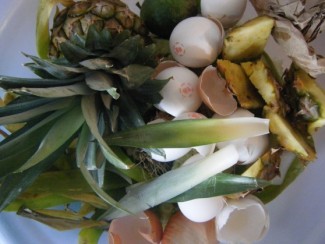
Saturday morning crew call is a party on the farm!
By: Nyssa Collins, NC State correspondent
A good turnout can bring twenty volunteers spilling out of cars. We are students and professors from NC State. We are parents and kids of any age, and families from the neighborhood, wondering what the heck is going on. We are school groups, church groups, and service groups (Haven House reliably sends a solid team). We are individuals who don’t have farm and garden experience, and wish we did. We arrive by van or carpool or bicycle any Saturday morning at 9:00am to the Food Shuttle Farm at 4505 Tryon Road.
The assembled crew – wearing fanny packs and sipping from water bottles – gathers around Sun for assignment. On the to-do list for the third Saturday of June:
- Suckering and tying tomatoes
- feeding the worms
- turning compost
- spreading mulch between the rows.
The intrepid Haven House kids grab wheel barrows and rakes, and head toward the mulch pile. The rest of us want to know what “suckering a tomato” means before we agree to anything.


A tomato sucker grows between the main branches of the tomato plant. They are tricky to spot because they look very similar to tomato branches and eventually get flowers and tomatoes of their own. Suckering is popping off the adventitious (out of place) branch with clippers or your hands – which will soon turn green from touching tomato plans. Why pull off tomato suckers, if they will grow tomatoes? Because they are SUCKERS: suckers of energy and sunlight from the rest of the plant. Growing these extra branches is inefficient if you want a few big and juicy tomatoes. It’s like if you have too many hobbies – you’re so overbooked you can’t do any of them well.

By 11:00, tomato tying and suckering is done, and the conversation invariably turns to food. (This is because we are starting to get hungry!) Any serious student of food and health somehow finds his way to the farm, eventually. For this reason, you can’t find a better place to trade recipes or learn how to cook a vegetable. Before humans get to eat lunch, the WORMS get to eat lunch.
The day is sure to wrap up by noon or 1:00, because it is already near 90 degrees. We’ve done some important work that would have been much harder with fewer people, and even managed to learn a couple of things. The day’s end doesn’t mean work on the farm is done: volunteers come out 7 days a week. After a hard morning’s work, most volunteers head home for the day. Some sit for a picnic in the shade with new friends. They’re resting up for more farming in the afternoon!
Crew Call
We are so THANKFUL for you – our wonderful volunteers – so we’re giving you the week off!! There will be no Crew Call the week of Thanksgiving. Farm staff and volunteers will take some well-earned time off with their families who have been very patient this year. We hope that each of you has a wonderful Thanksgiving holiday.
The next Crew-call will be Dec 5th, location to be announced.
Community Gardens
While there is no crew call, Amanda and Volunteers will be in the Mayview Garden on Wed, Nov 25th for any pre-Turkey day harvesting. Come out and join her if you’re in town 3:45-5:30. Please email Amanda (NutritionCoord@foodshuttle.org) if you’re thinking about stopping by.
New!! Farm & Garden Compost Crew
Farm & Garden volunteer extraordinaire Ron Paul Hunter will be heading up our latest project starting in December - the Food Shuttle Farm & Garden Compost Crew. Expanding on our current composting program that utilizes food waste from the IFFS Culinary Job Training Program, we will be processing spoiled produce from Food Shuttles loading dock as well as recruiting local coffee shops and restaurants to send us their food waste. *Start thinking now about which restaurant you want to talk to about donating their food scraps. We will also build a vermi-composting(worms) facility this winter in an existing barn at the IFFS Farm. Compost generated from the IFFS composting program will be used to improve soil structure at the Farm and our community gardens. The vermi-composting facility will be an exciting educational addition for kids and adults alike when visiting the Farm.
We need volunteers to work at Food Shuttle and the Farm to remove plastic and ties from compostable produce, and help Ron transport and incoporate that material into our compost wind-rows at the Farm. In the near future we hope to establish compost routes to pick up materials from our participating business. Join us in taking this next important step in making the Inter-Faith Food Shuttle Farm and Community Gardens truly sustainable. If you’re interested in helping out, please contact Ron at rphunter@civilizationcontinuity.org Thanks again for all of your wonderful work this season. We’ve done so much!
Happy Thanksgiving!







